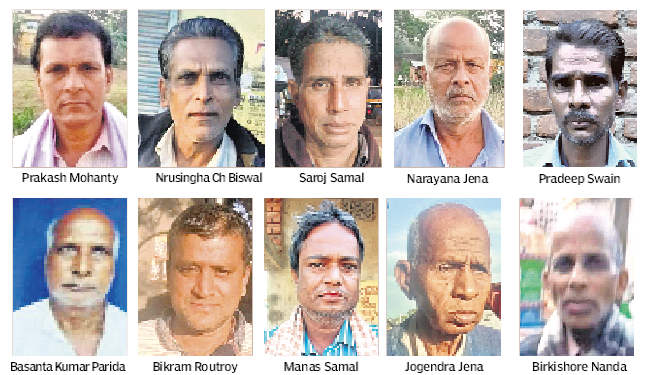Jajpur: The government’s claims and actions are not always in sync. This is particularly true when it comes to farmers. Despite the government claiming that it is with farmers, the latter are often exploited by millers and traders.
Sixteen farmers have committed suicide in the last four years alone in this district. It is an alarming reminder that the government should clean up its act. But the district administration claims there were no suicides by farmers.
Going by the last four years’ paddy procurement statistics, the distress sale of paddy is substantial. During this period 16 farmers ended their lives here, and the government’s paddy procurement fell short of target by 2,91,665 quintals.
The total area of farms in Jajpur district stands at 1,45,450 hectares. Of this 1,17,000 hectares are paddy cultivable lands. Government sources say 61,322 hectares (42 per cent) and 34,600 hectares (24 per cent) have been provided with irrigation facilities in the Kharif and Rabi seasons respectively. But farmers here face floods and droughts every year.
Jajpur is rich in mineral resources. There are 13 big industrial units in this district. But farmers here never go for other jobs. The district is far ahead of others in not only paddy cultivation, but also in vegetable farming.
The villains of the plot are the middlemen. They strike agreements with farmers to buy paddy for Rs 1,100 a quintal providing very little profit to farmers.
What aggravates things is the late opening of the paddy procurement centres. As mandis start late, farmers are forced to sell their produce at throwaway prices far below the government fixed MSP.
Cooperative societies also usurp money allotted under various schemes for sharecroppers in this district.
The government’s paddy procurement has never attained targets in the last four years. In 2014-15 the target was 8,51,852 quintals, but only 8,34,920 quintals were procured. The target was 9,92,646 quintals in 2015-16, but the actual procurement was 9,36,206 quintals. In 2016-17, of the targeted 8,29,411 quintals only 7,08,558 quintals of paddy was procured. In 2017-18, 6,08,441 quintals were procured, but the target was 7,05,882 quintals.
This season, the target was 5,44,000 quintals in the first phase. District civil supply department sources said 40,875.74 quintals have been procured so far through 26 Primary Agriculture Cooperative Societies (PACSs) till Monday.
The Collector had issued show-cause notices to the secretaries of 60 PACSs December 20 for the delay in opening mandis. But the notices had very little impact on the secretaries and farmers are still being exploited by middlemen.
The failure of the district administration and the civil supplies supply department has been taking its toll on farmers.
Due to these factors three farmers in Dharmasala block, three in Sukinda block, two in Binjharpur block, two in Dasarathpur block, two in Rasulpur block, one in Korei block, two in Jajpur block and one in Bari block have committed suicide since 2015.
Jajpur deputy director of agriculture Saratchandra Prusty said the government’s schemes have been implemented and farmers are benefitting from them.
“Our schemes have helped raise paddy production. We are fixing procurement targets according to the output every year,” he said.
Regarding farmer suicides, Prusty said he would give a report to the government after a detailed investigation.
Basant Kumar Parida, a farmer of Dharmasala block, said farmers are not happy with the government, and this may prove fatal for the ruling party in the coming general elections. Many debt-ridden farmers of Jajpur have committed suicide, but the government is not ready to accept it, he added.
He said that although the Biju Krushak Janata Dal has been reconstituted, farmers are not going to get any benefit from this as the leaders are not in direct touch with farmers.
Narayan Jena, a farmer of Rasulpur, said the administration and millers are responsible for the late opening of mandis. Farmers are forced to sell their produce at Rs 1,100 a quintal. Every year farmers are suffering losses, forcing them to commit suicide.
Farmers Prakash Mohanty of Jabara, Manas Samal of Jenapur, Jogendra Jena of Bhukutipat, Bikram Keshari Routray of Badachana, Pradeep Kumar Swain of Binjharpur, Saroj Samal of Bari, Birakishore Nanda of Batira and Nrusingha Charan Biswal of Salakana expressed similar views over the sorry state of affairs in the farm sector.
They said due to the late opening of mandis middlemen were exploiting farmers, and blamed the ‘nexus’ between the government and the millers for their woes.
Guv Vs Govt
The Supreme Court ruling on 8 April declaring as erroneous and illegal the action of Tamil Nadu Governor RN Ravi,...
Read more





































